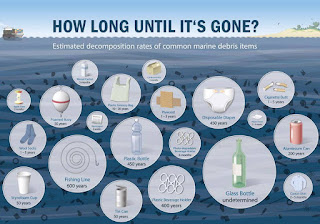Why Recycling Plastic is Actually Bad
Reduce, Reuse Recycle
We've all seen those posters on the school walls, right? Is that still a thing?
It was always reduce, reuse, recycle! It's the only way to save the Earth! ReDUCE, ReUSE, ReCYCLE.
But... Did you know that some recycling is actually worse for the environment than not recycling at all?
Think about it this way. You've got that plastic container in your hands (ice cream, yogurt, juice, whichever) and you're just about to toss it into your recycling bin. Why not, right? It's got the arrows, it goes in the bin. But not all plastics are the same. Glass, paper, aluminum, those are pretty simple. Not all of our plastics are made with the same materials, and that makes it a bit more complicated than tossing it in the bin and handing it off to the garbage man every Wednesday morning.
To use a quote from here ( http://discovermagazine.com/2009/jul-aug/06-when-recycling-is-bad-for-the-environment )
"But not all plastic can be recycled, and only about 6.8 percent of the total plastic used in the U.S. actually goes that route—although the rate is higher with bottles: 37 percent for soft drink and 28 percent for milk and water bottles."
A main problem is how complex plastics really are. Yogurt, orange juice, milk, ice cream containers, sour cream, etc. all have different chemical makeups that make them into the container they are. They have different dyes, different materials, different ingredients in general. It's more in depth than just being.. plastic. Because of this, each plastic can only be recycled with other same plastics. You know how we release gas toxins into the air when the machines and factories recycle the plastics? Well, it seems like a good idea because at least the plastics are being made into something again instead of being in a landfill. Now, imagine those toxins being pushed into the air for absolutely no reason... That's what happens when incompatible plastics are melted down together. An entire batch of what could've been used again is now just garbage that's going to be tossed into a landfill.
As a result of this, most plastics can't actually be recycled. Sorting all the plastics is actually quite difficult and it's not foolproof for machine nor man. Because of this, most facilities don't actually recycle the plastics that are sent to them. Some do, though, at the risk of weakened plastics that may or may not do the job they're designed to do.
To borrow another quote from discover magazine (same article as above):
"Seventh Generation, a company that makes eco-friendly household products, is increasing the recycled content of all its packaging, with a goal of 75 percent for all products by the end of the year."
Which is amazing, but Seventh Generation is an exception to the whole thing. Most companies don't go to this extent to make sure they're products are eco-friendly. Most companies are not consistent with their recycled content use, so the quality of the products made with recycled products varies. I don't know about you, but I don't want to be lifting a gallon of milk and have it open up at the handle. I just want my granola, not a milk bath.
Instead of tossing your plastics in a plastic bag and handing them off to a facility that's going to cause more harm than good, try re-using them instead. I've been collecting my bottles lately (I have roomies and a husband who are not so eco-friendly as I try to be) in the hopes of making a hanging garden! Reusing your plastics (if you can) is better than tossing them off every week. Stick around to see a hanging garden first hand (: I swear I'm getting to it this week!

Comments
Post a Comment